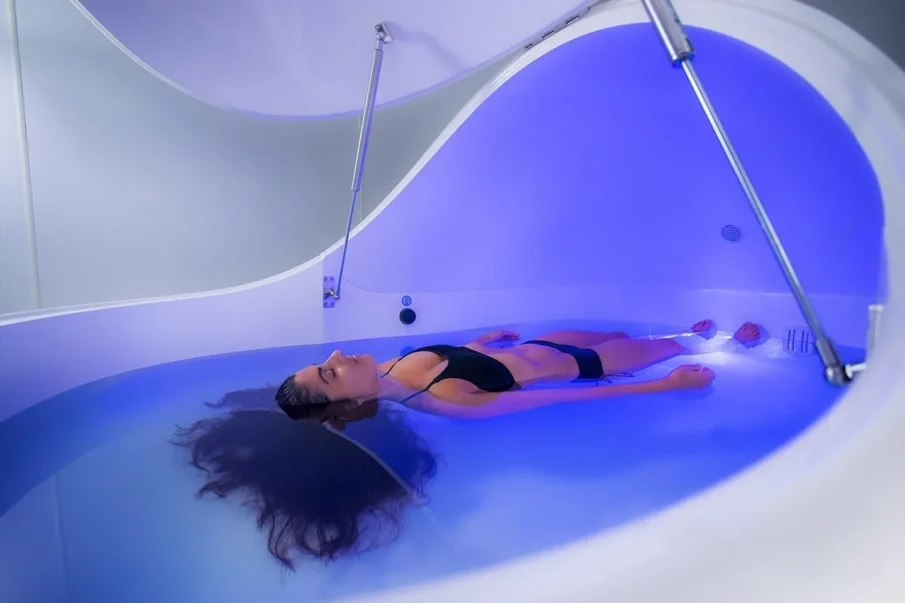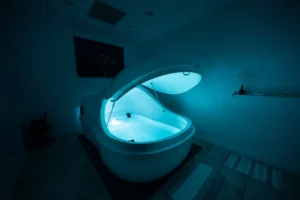In today’s fast-paced world, anxiety has become a common issue affecting millions globally. While traditional treatments such as medication and therapy are effective, many people are searching for alternative methods to manage stress and anxiety. One such promising approach is float therapy. In this comprehensive guide, we will explore what float therapy offers, the benefits of float therapy, and how float session therapy can help improve mental health without relying on medication.
Float Therapy What Is It?
Float therapy, also known as sensory deprivation float therapy, is a wellness technique where individuals float in a specially designed tank filled with saltwater. The water is heated to skin temperature, and the environment is completely dark and silent, minimizing sensory input. The purpose of sensory deprivation tank is to create a state of deep relaxation by removing external stimuli, allowing the body and mind to experience profound rest.
Many studies suggest that sensory deprivation float therapy can reduce stress, alleviate anxiety, and even improve mood. For individuals seeking non-medication methods for anxiety, understanding float therapy is the first step toward a potentially life-changing experience.
How Float Therapy Offers Stress Relief
One of the most appealing aspects of float therapy is its ability to relieve stress. A float therapy session provides an environment free from distractions, enabling your mind to focus entirely on relaxation. The float session benefits include lowered cortisol levels, reduced blood pressure, and overall improvement in mood.
Float therapy offers a unique combination of mental and physical benefits that traditional relaxation methods may not provide. By reducing sensory input, the body enters a meditative state naturally, promoting deep mental rest and emotional calm.
The Science Behind Float Therapy
The science behind float therapy revolves around sensory deprivation and the body’s response to zero-gravity-like conditions. When floating in a floatation tank, the body is supported by highly concentrated Epsom saltwater, which allows you to float effortlessly. This reduces tension in muscles, promotes healing, and releases endorphins that improve mood.
Research shows that float tank therapy benefits include reduced symptoms of anxiety, improved sleep quality, and even relief from chronic pain. The effects of float therapy on the nervous system are profound: it helps shift the body from a sympathetic “fight or flight” state to a parasympathetic “rest and digest” state, essential for managing anxiety.
Health Benefits of Float Therapy
Health benefits of float therapy extend beyond mental well-being. Many individuals experience relief from physical ailments such as chronic pain, migraines, and muscle tension. Additionally, float therapy for relaxation promotes better circulation and reduces inflammation.
A float therapy session provides full-body relaxation, which enhances both physical and mental recovery. Some of the most notable float tank anxiety benefits include reduced stress levels, enhanced focus, and improved emotional resilience.
Benefits of Sensory Deprivation Float Tanks
Benefits of sensory deprivation float tanks are numerous, making them a compelling alternative therapy for anxiety and stress. These include:
- Deep relaxation and stress relief
- Decreased anxiety and depressive symptoms
- Enhanced creativity and mental clarity
- Improved sleep patterns
- Relief from muscle tension and pain
By minimizing external distractions, sensory deprivation float therapy allows the brain to enter a state similar to meditation. Many people report feeling rejuvenated and refreshed after just one session.
Float Therapy for Depression and Anxiety
Float therapy has gained attention for its potential in supporting mental health. Float therapy for depression shows promise as studies indicate improvements in mood and reductions in stress hormones. Similarly, float tank anxiety sessions have helped individuals manage chronic anxiety without medication.
During a float therapy session, the mind becomes deeply relaxed, allowing suppressed thoughts and emotions to surface, which can aid in emotional processing and mental clarity. For many, float therapy offers a safe, non-invasive way to support mental health.
The Benefits of Floatation Tanks
The benefits of floatation tanks go beyond stress and anxiety management. They include:
- Enhanced relaxation and mindfulness
- Reduced muscle and joint pain
- Increased focus and mental clarity
- Better sleep quality
- Improved overall sense of well-being
Whether you are seeking mental or physical relief, the benefits of float therapy make it an excellent addition to your wellness routine. Float therapy offers a unique approach to achieving both physical and emotional balance.
What to Expect in a Float Therapy Session
If you’re new to float therapy, here’s what a typical float therapy session looks like:
- You enter a private float tank filled with warm, salty water.
- The lights and sounds are turned off, creating a sensory-deprived environment.
- You float effortlessly while your body relaxes completely.
- Sessions typically last between 60 to 90 minutes.
- Afterward, you exit the tank feeling refreshed and calm.
The float session benefits are cumulative. Regular sessions can improve anxiety management, sleep quality, and overall mental well-being. Many clients report that float therapy offers a sense of peace and rejuvenation unmatched by other relaxation methods.
Effects of Float Therapy on the Body and Mind
The effects of float therapy are both physiological and psychological. Physiologically, the body experiences muscle relaxation, pain relief, and improved circulation. Psychologically, floating reduces anxiety, enhances mood, and promotes a sense of calm.
Isolation tank therapy, another term for sensory deprivation float therapy, has been shown to reduce stress markers and enhance mental clarity. People who regularly experience float deprivation tank benefits often report better coping skills and reduced feelings of overwhelm.
Benefits of Float Therapy for Relaxation
Relaxation is perhaps the most immediate benefit of float therapy. Float therapy for relaxation provides:
- A quiet, stress-free environment
- Deep physical and mental relaxation
- Reduction in tension and anxiety
- A sense of emotional balance
The benefits of float therapy extend into daily life, helping individuals handle stress more effectively and maintain a positive mindset. Float therapy offers a natural, non-medication-based approach to achieving this state.
Who Can Benefit from Float Therapy?
Almost anyone can benefit from float therapy. It is especially helpful for:
- Individuals experiencing chronic stress or anxiety
- People seeking alternative therapies for depression
- Athletes recovering from physical strai
- Those needing deep relaxation and mindfulness
- Anyone wanting to improve overall mental and physical health
By understanding float therapy what it is, you can see how accessible and versatile this wellness approach can be. The benefits of float therapy are not limited to mental health; physical health improvements are also significant.
Float Therapy Offers Non-Medication Alternatives
For those hesitant to use medication for anxiety, float therapy offers an effective alternative. With regular sessions, many individuals report:
- Decreased anxiety levels
- Improved sleep and restfulness
- Enhanced emotional balance
- Reduced need for medication
Incorporating float therapy offers into your wellness routine can be a transformative experience. The natural combination of sensory deprivation, buoyancy, and isolation provides an environment where the mind and body can heal simultaneously.
Frequently Asked Questions (FAQ)
- How often should I try float therapy for anxiety?
Most experts recommend starting with 1–2 sessions per week. Over time, sessions can be adjusted based on personal needs and response to therapy. - Is float therapy safe for everyone?
Yes, float therapy is generally safe. However, individuals with certain medical conditions, like severe skin conditions or epilepsy, should consult a doctor before using a floatation tank. - Can float therapy replace medication?
Float therapy can help manage symptoms of anxiety and depression, but it should not replace prescribed medication without consulting a healthcare professional. - How long is a typical float session?
A typical float therapy session lasts between 60 to 90 minutes, though some facilities offer shorter or longer options. - What are the main benefits of float therapy?
The main float session benefits include deep relaxation, reduced anxiety, improved sleep, enhanced mood, and pain relief. - Will I feel claustrophobic in a float tank?
Most float tanks are designed to feel spacious, and many people quickly adapt to the dark, quiet environment. Staff can provide guidance to ensure comfort. - What should I do before a float session?
It’s recommended to shower before entering the tank and avoid caffeine. Wearing loose clothing afterward enhances the post-float relaxation experience.
In conclusion, float therapy offers an innovative, non-medication-based approach to managing anxiety and stress. From its scientifically backed float tank therapy benefits to its relaxing and restorative properties, the effects of float therapy are extensive and holistic. Whether you seek relief from anxiety, depression, or simply want to enhance overall well-being, exploring float therapy offers could be the step toward a calmer, healthier life.





